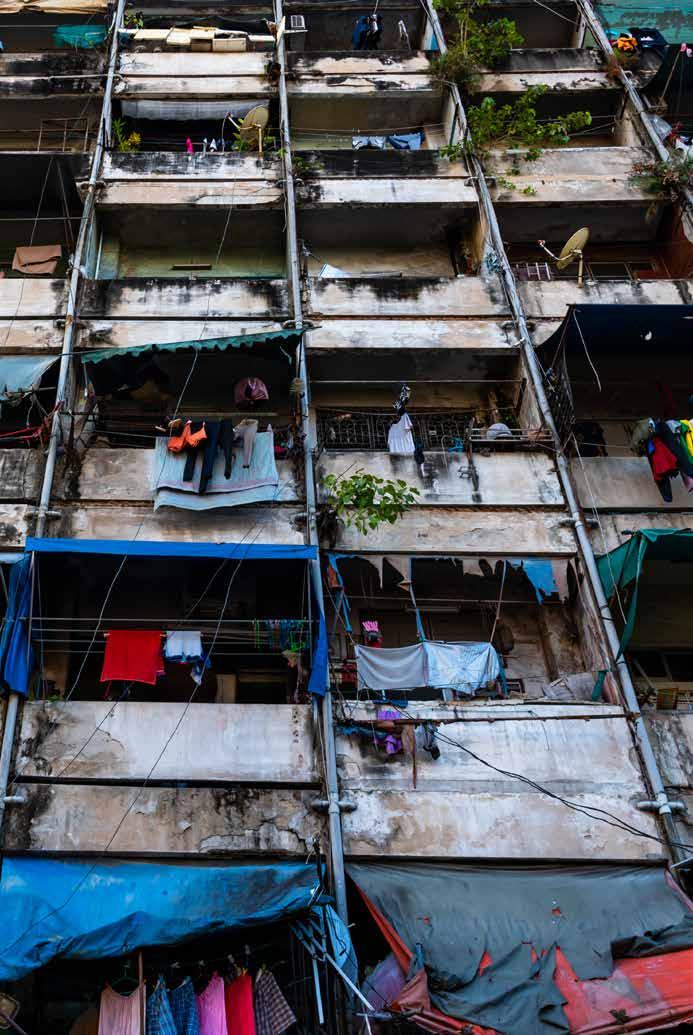
8 minute read
2 | Informality in Different Discourses
2INFORMALITY IN DIFFERENT DISCOURSES
© UN-Habitat/Julius Mwelu
Advertisement
2.1 Informality in the Economic Discourse
The informal economy is the oldest and best-studied di-
mension of informality. While the discourse still faces the difficulties in quantifying and defining informality,3 there is broad consensus about its growing importance over the last decades. Economic informality is the major generator of new employments in the developing world, even if accompanied by high levels of underemployment, insecurity and low-income level.4 The informal sector accounts for up to 80% of certain national economies in the developing world, but even represent between 8 and 10% in Western Europe and the United States.5
Two broad explanations for the existence and persistence
of informality are put forward. Both share a common tendency to equate informal economy with illegality and poverty.6 In a structuralist interpretation, informality is perceived as a consequence of an uneven capitalistic development and “bad” for the economy and the state.7 The second school of thought is called legalists and emphasizes the competitive advantages of informality.8
Informality is seen as a rational response to (over)regulation. In such light, informality is often equated with the
3 – Chen, 2006. 4 – Vanek, 2014. 5 – Portes and Schauffer, 1993; Becker 2004. 6 – Berner, 2001; Gilbert, 1990. 7 – Kanbur, 2011. 8 – such as self-employment, flexible labor safety rules compliance, for an overview, see. Rakowski, 1994. 9 – Bromley, 1990. 10 – De Soto, 2003. 11 – Gilbert, 2002. 12 – Durand-Lasserve and Royston, 2002. 13 – for an overview, see Peattie, 1987. activities of creative and self-employed urban poor whose potential is primarily curtailed by a lack of access to financial resources. Scholars like Hernando de Soto describes the “informals” as “plucky entrepreneurs making a major contribution to the national economy.”9 The argument put forward is that informality should not be suppressed but rather be unlocked by regularizing the “dead capital” of informal goods and real-estate assets through large-scale legalization campaigns.10
While politically appealing, due to its apparent economic benefits and strong linkages to poverty alleviation, such approach has been highly questioned for its actual effects on the lives of the urban poor.11 This criticism has been particularly voiced by proponents of the land management discourse,12 who argue that not legal titles (de jure) are primarily needed but de facto tenure security shifting the importance from laws to politics.
The concept of the informal economy has undergone a
considerable development with the common denominator of perceiving informality as activities that transgress formal regulations. While the initial description of Hart was very rich in detail, addressing political roots and cultural aspects, the adoption of the concept by international organizations is paralleled by a reduction to a mere economic understanding.13 From such angle, three different levels of non-compliance with formality may be distinguished: the avoidance of labour laws, tax evasion, and the non-respect of official norms and standards.
The incentives for economic activities to remain informal
can be different – the majority of informal workers and businesses have little other choices. Still, a distinguishable share of informal entrepreneurs moves to or remains in this sphere to benefit from competitive advantages (ease of entry, reduced operational costs, no tax burden). Infor-
mal economic activities are often flexible and small-scale with skills “often acquired outside of formal education, labour-intensive methods of production and adapted technology.”14 While it has been argued that there is no theoretical justification to analytically exclude informal practices of the corporate sector (fraud, corruption, etc.), this is hardly done in practice.15
2.2 Informality in the Housing Discourse
The relation of informality and housing is intimately
connected to the idea of self-help. This idea can be traced back to the early 1960s and the writings of John Turner, Charles Abrams and William Magnin.16 Turner, an architect who is less the inventor than the promoter of the idea of self-help, took interest in the shelter provision logic of the urban poor and carried out extensive field research on squatter settlements in Peru.17
In his publications, Turner describes the efficient and natural way rural-urban migrants meet their basic housing needs through auto-construction. The concept of selfhelp refers to irregular construction practices organised by the end-user. Such activities often avoid taxes and permits. The discourse perceives the formal and the informal as mutually exclusive. Whereas the informal leans on traditional material and techniques related to family and subsistence, the formal is equated with modernity led by the state. Turner argues that governments should refrain from oppressing and destroying informal construction but acknowledge their valid contribution to solving escalating housing shortages.
The idea of self-help directly informed World Bank sup-
ported housing programs of the first generation such as sites and services and slum upgrading schemes. In its Vancouver conference (1976), the UN-Habitat also endorsed a housing program based on the concept of self-help. In practice, such initiatives greatly lagged behind expectations (see review paper on the challenge of slums),18 which partly reflects the limitations of their theoretical basis.

14 – Portes and Schauffer, 1993. 15 – Tokman, 2016. 16 – Abrams, 1977. 17 – Harris, 2003. 18 – Bredenoord and Lindert, 2010.

The concept of self-help concentrates on auto-construc-
tion and its cost-saving potential without addressing causal links with small-scale production, irregular status, and aligning the construction process to financial capacities. Most projects had only limited success as they attempted to formalize self-help, which added bureaucratic obstacles resulting in time delay, escalating prices, and commercialization of housing supply.
Later authors, following particularly the categorization of Drakakis-Smith19 contextualize building practices of selfhelp into a larger framework of informal housing options.20 Such scholars also broadened the concern to incorporate issues of tenure status, regulatory conformity, and the politics of land. With the broadening of concern, the definition of informality surpasses the concept of self-help. However, over the last two decades, academic attention on the topic of informal housing and self-help has been rather minimal21 and the discourse largely dissolved into the urban planning and land management literature.
19 – Drakakis-Smith, 1981. 20 – see for example Kombe and Kreibich, 2000. 21 – Bredenoord and Lindert, 2010. 22 – Durand-Lasserve and Selod, 2009. 23 – Bukhari, 1982; Al Sayyad, 1993; Payne, 2001.
2.3 Informality in the (Land) Tenure Discourse
The debate on informal tenure breaks with conceptu-
al dichotomies. Discussions on land tenure systems in developing countries have heavily relied on the concepts of formality and informality while at the same time managing to break with their dichotomous configuration. The discourse stresses the social dimension of informality by perceiving informality as an alternative institutional structure that guarantees rights associated with land. In contrast to developed countries, where tenure is associated with written rights and property titles, in most parts of the Global South tenure remains a product of constant social relations and negotiations.22 These tenure systems are products of extremely complex historical, cultural, and institutional processes.23
The state has an active stake in drawing lines between
informality and formality. Proponents of this discourse perceive the origin of informal tenure, on the one hand as the natural (customary) status, on the other hand as state-produced due to high technical standards and regulatory frameworks, political inflexibility and failure of adequate formal provision. The focal point of the land tenure discourse is to illustrate the diversity of tenure agreements in the absence of the State and legal titles.
Unlike the economic discussion around Hernando de Soto that focuses on de jure title (legal tenure security), proponents of this discourse argue for the need for de facto
security. Informal institutions and actors, such as religion and beliefs, family and communal structures, and (informally acting) politicians and landlords, are of central importance in securing tenure rights worldwide. In such view, the formal and informal are not perceived as opposites but rather as an array of tenure arrangements spanning from formal titles to degrees of informality as involved in land subdivision and squatted settlements.24
The land management debate is interested in the
influences of the formal on the informal and vice-versa. Evidence points at an increasing superposition of formal and informal logic: e.g. informal land subdivisions adopting layouts and institutions from the “formal” city or the increasing replacement of reciprocal and distributional exchanges by market-based transactions. With ongoing commodification, informal property markets seem to obey the same laws and principles as any other market.25 Another form of formalization consists of governmental attempts “by which informal tenure is integrated into a system recognized by public authorities.”26
Given this diversity, scholars have put forward a system of classifying the level of informality based on the level of tenure security and the associated rights.27 The elaboration of a formal-informal degree, though limited in its focal lens (tenure), is one of the biggest contributions of this discourse to an interdisciplinary discussion.

2.4 Informality in the (Urban) Planning Discourse
Informality has also become a concern for planning schol-
ars over the last two decades.28 Conceptually, the discussion connects to the debates of housing studies in Latin America (Abrams, Turner, Magnin) while distancing itself from the pure economic informality promoted by the ILO.29 The emphasis, however, is on the political and socio-cultural dimensions of the informal. Such concerns emphasize the active construction of informality by planning practices. While sharing the argument of economic legalists that formal regulations are the underlying cause of informality, this discourse also highlights the ideologies and motivation involved in legal and regulatory practices.
Informality is conceived as a direct product of the govern-
ment that voluntarily ignores (laissez-faire), erases (omission from city maps, slum destruction), but also eventually supports and stimulates. The aim of this scholarship is to show the selective governmental tolerance towards different kinds of informality: high-end development projects are tolerated and legitimized (a process described by Oren Yiftachel as “the whitening of grey cities”) while informal settlements face omission, repression or destruction.30
24 – Keivani and Werna, 2001; Kombe and Kreibich, 2000. 25 – Kombe and Kreibich, 2000. 26 – Durand-Lasserve and Selod, 2009. 27 – Payne, 2002. 28 – Innes et al., 2007; Al Sayyad and Roy, 2004. 29 – Al Sayyad, 2004. 30 – “blackening” process, see Yiftachel, 2009.







